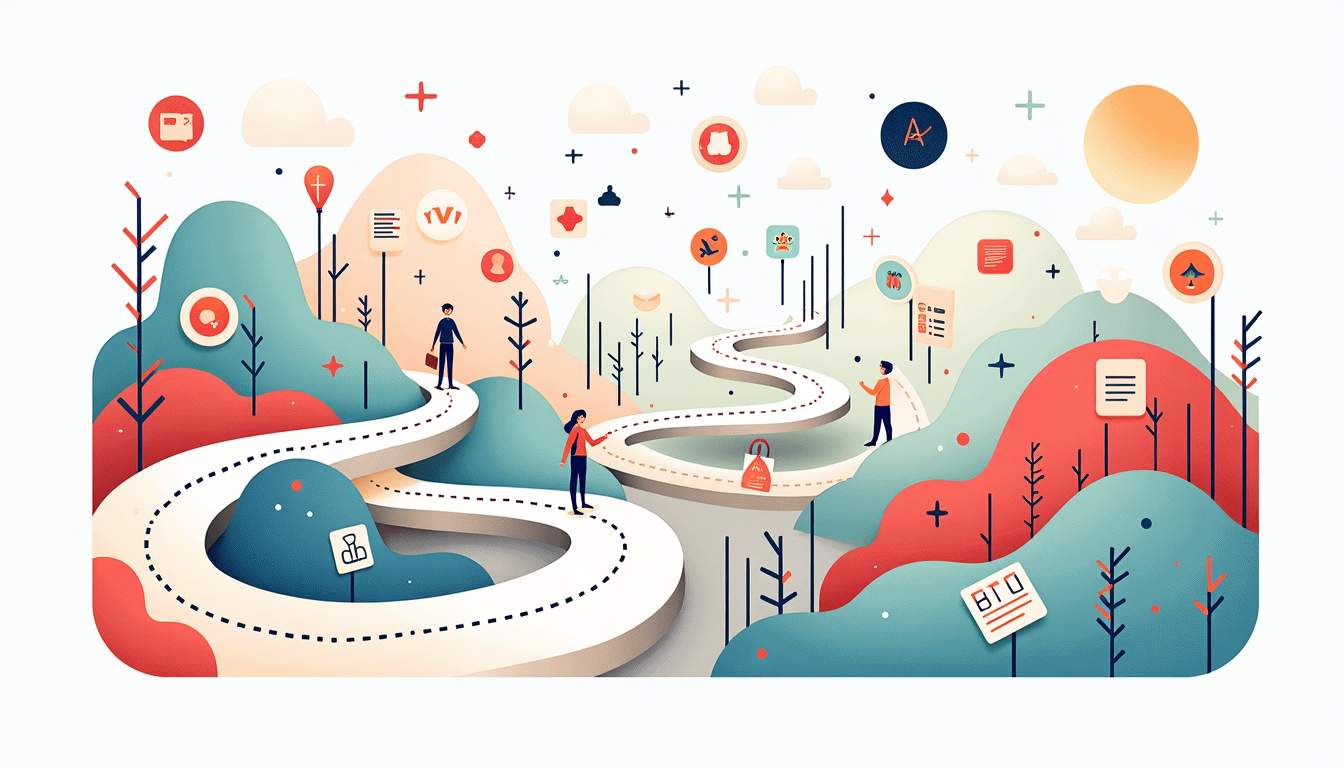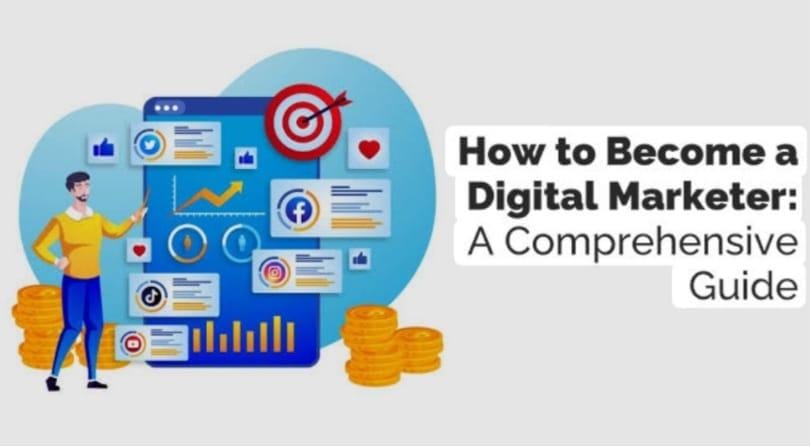Contents
- 1 Introduction:
- 2 Understanding What Digital Marketing Entails:
- 3 The Growing Importance of Digital Marketing:
- 4 Step by Step Guide to Becoming a Digital Marketer:
- 4.1 Step 1: Build a Strong Foundation of Marketing Knowledge
- 4.2 Step 2: Gain Practical Skills and Hands-On Experience
- 4.3 Step 3: Specialize in a Digital Marketing Discipline
- 4.4 Step 4: Stay Updated with Industry Trends and Continuous Learning
- 4.5 Step 5: Build Your Personal Brand and Network
- 4.6 Step 6: Apply for Jobs and Prepare for Interviews
- 4.7 Step 7: Grow Your Career and Explore Advanced Opportunities
- 5 20 FAQs on Step by Step Guide to Becoming a Digital Marketer:
- 6 Conclusion:
- 7 Take Your Digital Marketing Career to New Heights with Yogitha Jain
Introduction:
Step by Step Guide to Becoming a Digital Marketer – this is the blog all about. In today’s fast-paced digital world, marketing has evolved beyond traditional methods into a dynamic, data-driven discipline known as digital marketing. If you’re considering a career in this exciting field, understanding the pathway to becoming a successful digital marketer is essential. This guide will walk you through the necessary steps, skills, and strategies to help you build a rewarding career in digital marketing.
Understanding What Digital Marketing Entails:
Before diving into the steps, it’s important to grasp what digital marketing really involves. At its core, digital marketing is the promotion of products or services using digital channels such as search engines, social media, email, websites, and mobile apps. Unlike traditional marketing, it leverages technology to reach targeted audiences more effectively and measure campaign success through analytics.
Digital marketing covers a broad range of specialties including search engine optimization (SEO), pay-per-click advertising (PPC), content marketing, social media marketing, email marketing, and affiliate marketing. Each area requires distinct skills and tools, but they all share a common goal: to connect brands with customers online. The integration of these various components allows businesses to create comprehensive strategies that can adapt to changing market conditions and consumer behaviors, ensuring that they remain relevant in an ever-evolving digital landscape.
The Growing Importance of Digital Marketing:
With more consumers spending time online, businesses are shifting their budgets from print and broadcast advertising to digital platforms. This shift has created a surge in demand for digital marketing professionals who can craft compelling campaigns that convert clicks into customers. According to industry reports, digital marketing jobs are expected to grow significantly in the coming years, making it a promising career choice. Moreover, the ability to analyze vast amounts of data in real-time allows marketers to fine-tune their strategies, optimize their spending, and ultimately drive higher returns on investment.
As the digital space continues to expand, new trends and technologies are emerging that further enhance the capabilities of digital marketing. For instance, the rise of artificial intelligence and machine learning is transforming how marketers understand consumer behavior and personalize their messaging. Additionally, the growing importance of video content and interactive media is reshaping engagement strategies, making it essential for brands to adapt to these formats to capture and retain audience attention. Staying ahead in this dynamic environment requires continuous learning and adaptation, as digital marketing evolves at a rapid pace.
Step by Step Guide to Becoming a Digital Marketer:
Step 1: Build a Strong Foundation of Marketing Knowledge
Starting with a solid understanding of marketing principles is critical. Even though digital marketing is technology-driven, the core concepts of branding, customer behavior, market research, and communication remain relevant. A deep comprehension of these principles will not only enhance your strategic thinking but also empower you to adapt to the ever-evolving landscape of marketing.
Consider enrolling in foundational marketing courses offered by universities or online platforms like Coursera, Udemy, or LinkedIn Learning. These courses often cover topics such as marketing strategy, consumer psychology, and the marketing mix (product, price, place, promotion). Additionally, many of these platforms offer certifications that can bolster your resume and demonstrate your commitment to prospective employers.
Learn the Basics of Digital Channels:
Alongside general marketing knowledge, familiarize yourself with the main digital channels. Understand how search engines work, the basics of social media platforms, and the fundamentals of email marketing. This knowledge will help you decide which areas interest you most and where to focus your efforts. For instance, grasping the principles of Search Engine Optimization (SEO) can significantly enhance your ability to drive organic traffic to websites, while understanding the nuances of pay-per-click (PPC) advertising can help you create effective ad campaigns that yield measurable results.
Moreover, it’s essential to stay updated on emerging trends within these channels. The digital marketing landscape is constantly changing, with new tools and techniques being developed regularly. Subscribing to industry blogs, attending webinars, and participating in online forums can provide valuable insights and keep you informed about the latest best practices. Engaging with communities on platforms like LinkedIn can also facilitate networking opportunities, allowing you to connect with industry professionals and learn from their experiences.
Step 2: Gain Practical Skills and Hands-On Experience
Theoretical knowledge alone won’t make you a proficient digital marketer. Practical skills are essential to execute campaigns and analyze results effectively. Start by learning key digital marketing tools and techniques.
Master Essential Digital Marketing Tools:
Some tools are industry standards and mastering them can significantly boost your employability. For SEO, tools like Google Analytics, Google Search Console, and SEMrush are invaluable. For social media marketing, platforms such as Facebook Business Manager and Hootsuite help manage campaigns and schedule posts. Email marketing platforms like Mailchimp and Constant Contact are widely used for creating and tracking email campaigns.
Additionally, basic graphic design skills using Canva or Adobe Spark can help you create engaging visuals, while familiarity with content management systems like WordPress is often required for content marketing roles.
Work on Real Projects:
Apply your skills by working on real or simulated projects. You can start by creating your own blog or social media page to practice content creation and audience engagement. Volunteering to manage marketing for a local nonprofit or small business can provide valuable experience and references.
Internships and freelance opportunities are also excellent ways to gain hands-on experience. They expose you to real-world challenges and help you build a portfolio that showcases your abilities to potential employers.
Step 3: Specialize in a Digital Marketing Discipline
Digital marketing is a broad field, and specialists are often in higher demand than generalists. After gaining foundational knowledge and practical experience, consider focusing on one or two areas that align with your interests and strengths.

Popular Specializations in Digital Marketing:
- Search Engine Optimization (SEO): Focuses on improving website visibility in organic search results.
- Pay-Per-Click Advertising (PPC): Involves managing paid ad campaigns on platforms like Google Ads and social media.
- Content Marketing: Creating and distributing valuable content to attract and retain customers.
- Social Media Marketing: Building brand awareness and engagement through social media channels.
- Email Marketing: Designing and executing email campaigns to nurture leads and drive sales.
- Affiliate Marketing: Partnering with affiliates to promote products and earn commissions.
Choosing a specialization allows you to deepen your expertise, making you a valuable asset for companies looking for specific skill sets.
Step 4: Stay Updated with Industry Trends and Continuous Learning
Digital marketing is an ever-evolving field. Algorithms change, new platforms emerge, and consumer behaviors shift rapidly. To stay competitive, continuous learning is essential.
Follow Industry Blogs and Influencers:
Subscribe to reputable digital marketing blogs such as Moz, Neil Patel, HubSpot, and Search Engine Journal. These sources provide timely updates, tutorials, and case studies that can help you stay informed about the latest trends and best practices.
Attend Webinars, Workshops, and Conferences:
Participating in industry events offers opportunities to learn from experts, network with peers, and discover innovative tools and strategies. Many conferences now offer virtual attendance options, making it easier to access valuable content from anywhere.
Earn Certifications:
Certifications from recognized organizations can validate your skills and enhance your resume. Google offers certifications in Google Ads and Google Analytics, while HubSpot Academy provides courses in inbound marketing and content marketing. These credentials demonstrate your commitment to professional development and can give you an edge in the job market.
Step 5: Build Your Personal Brand and Network
In digital marketing, your personal brand and professional network can open doors to new opportunities. Establishing yourself as a knowledgeable and reliable professional helps attract clients, employers, and collaborators.

Create a Professional Online Presence:
Develop a LinkedIn profile that highlights your skills, experience, and accomplishments. Share articles, insights, and your own content regularly to showcase your expertise. Consider creating a personal website or blog where you can display your portfolio, case studies, and testimonials.
Engage in Networking:
Join digital marketing groups on social media platforms and participate in discussions. Attend local meetups or virtual networking events to connect with industry professionals. Building relationships can lead to mentorship, partnerships, and job referrals.
Step 6: Apply for Jobs and Prepare for Interviews
Once you have built a solid foundation, practical experience, specialization, and a strong personal brand, it’s time to enter the job market.
Tailor Your Resume and Portfolio:
Highlight relevant skills, certifications, and projects that demonstrate your ability to deliver results. Use metrics where possible, such as increased website traffic or improved conversion rates, to quantify your impact.
Prepare for Common Interview Questions:
Be ready to discuss your experience with various digital marketing tools, how you approach campaign planning, and how you measure success. Employers may also ask about your problem-solving skills and ability to stay current with industry changes.
Consider Entry-Level Roles and Internships:
Starting as a digital marketing assistant, coordinator, or intern can provide valuable learning opportunities and a pathway to more advanced positions. Be open to contract or freelance roles as well, which can help you gain diverse experience.
Step 7: Grow Your Career and Explore Advanced Opportunities
Digital marketing offers numerous career advancement paths. With experience, you can move into managerial roles, lead teams, or specialize further in areas like data analytics or marketing automation.

Develop Leadership and Analytical Skills:
Strong communication, project management, and analytical abilities are essential for senior roles. Taking courses in data analysis, customer relationship management (CRM) software, and leadership can prepare you for these positions.
Consider Freelancing or Starting Your Own Agency:
Experienced digital marketers often choose to work independently or launch agencies. This path offers flexibility and the potential for higher earnings but requires entrepreneurial skills and business acumen.
20 FAQs on Step by Step Guide to Becoming a Digital Marketer:
1. Q: What is the best step by step guide to becoming a digital marketer?
A: The best step by step guide to becoming a digital marketer includes learning basics like SEO, social media, ads, email marketing, analytics, and then practicing with real projects.
2. Q: Why should I follow a step by step guide to becoming a digital marketer?
A: Following a step by step guide to becoming a digital marketer helps you avoid confusion, focus on one skill at a time, and build a strong career foundation.
3. Q: Can beginners use a step by step guide to becoming a digital marketer?
A: Yes! A step by step guide to becoming a digital marketer is perfect for beginners because it explains complex topics in simple, easy-to-follow steps.
4. Q: How long does it take if I follow a step by step guide to becoming a digital marketer?
A: If you follow a step by step guide to becoming a digital marketer, it usually takes 3–6 months to learn basics and 1 year to get good at it.
5. Q: Do I need money to start with a step by step guide to becoming a digital marketer?
A: No, a step by step guide to becoming a digital marketer often uses free tools like Google Analytics, Canva, and WordPress to help you start with zero cost.
6. Q: What skills are covered in a step by step guide to becoming a digital marketer?
A: A step by step guide to becoming a digital marketer covers SEO, content, social media, paid ads, email marketing, and analytics.
7. Q: Is a step by step guide to becoming a digital marketer good for freelancers?
A: Yes, freelancers can use a step by step guide to becoming a digital marketer to build a portfolio, get clients, and grow their freelance business.
8. Q: Do companies trust someone who follows a step by step guide to becoming a digital marketer?
A: Yes, many companies value practical knowledge. A step by step guide to becoming a digital marketer shows you know the process from basics to advanced skills.
9. Q: What tools will I learn from a step by step guide to becoming a digital marketer?
A: In a step by step guide to becoming a digital marketer, you’ll learn tools like Google Ads, Meta Ads Manager, Canva, Mailchimp, and SEO keyword tools.
10. Q: Can I get a job by following a step by step guide to becoming a digital marketer?
A: Yes. Many people land entry-level jobs after following a step by step guide to becoming a digital marketer because they show skills and results.
11. Q: Is a step by step guide to becoming a digital marketer useful for small businesses?
A: Absolutely. A step by step guide to becoming a digital marketer helps small business owners grow online with low cost and smart strategies.
12. Q: Do I need a degree if I use a step by step guide to becoming a digital marketer?
A: No, a step by step guide to becoming a digital marketer gives you enough practical skills to work without a formal degree.
13. Q: Can students follow a step by step guide to becoming a digital marketer?
A: Yes, students can easily follow a step by step guide to becoming a digital marketer while studying, and later use it to start freelance or job careers.
14. Q: Does a step by step guide to becoming a digital marketer include SEO training?
A: Yes, a step by step guide to becoming a digital marketer always includes SEO training since it is the backbone of online marketing.
15. Q: How does a step by step guide to becoming a digital marketer help with social media?
A: A step by step guide to becoming a digital marketer teaches how to plan, post, and grow social media accounts effectively.
16. Q: Can I learn paid ads through a step by step guide to becoming a digital marketer?
A: Yes, a step by step guide to becoming a digital marketer explains how to run Google Ads and Meta Ads with small budgets.
17. Q: Is email marketing included in a step by step guide to becoming a digital marketer?
A: Definitely. Email marketing is part of every good step by step guide to becoming a digital marketer because it builds customer loyalty.
18. Q: How do I practice using a step by step guide to becoming a digital marketer?
A: To practice, use a step by step guide to becoming a digital marketer by creating a blog, running small ads, and managing sample social pages.
19. Q: Does a step by step guide to becoming a digital marketer guarantee success?
A: A step by step guide to becoming a digital marketer doesn’t guarantee instant success, but it gives you a clear path to build skills and grow steadily.
20. Q: Where can I find the most reliable step by step guide to becoming a digital marketer?
A: You can find the most reliable step by step guide to becoming a digital marketer in detailed blogs, online courses, and free resources by trusted experts.
Conclusion:
Becoming a digital marketer is a journey that combines continuous learning, practical experience, and strategic specialization. By following this comprehensive pathway—from building foundational knowledge to developing a personal brand and advancing your career—you can position yourself for success in a dynamic and rewarding industry. Whether you aspire to work for a global brand, a startup, or as a freelancer, the skills and strategies outlined here will help you navigate the evolving digital marketing landscape with confidence.
Take Your Digital Marketing Career to New Heights with Yogitha Jain
Ready to transform your digital marketing aspirations into reality? Partner with Yogitha Jain, Chennai’s best digital marketer, and gain access to a full spectrum of cutting-edge services including SEO, AEO, GEO ads, and more. With a proven track record of delivering tangible results, Yogitha Jain is dedicated to elevating your brand’s online presence. Don’t miss this opportunity to work with an expert. Call Now and embark on your journey to digital marketing excellence.

